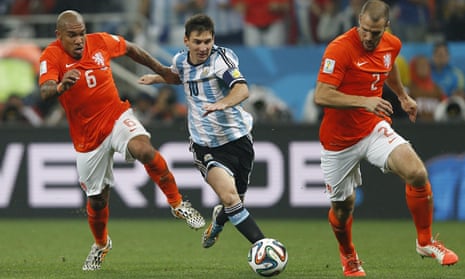Nobody, Toni Kroos insisted on Tuesday night, wins the World Cup after a semi-final. Jogi Löw pursued the theme: there had been no exultation in the dressing room, he insisted; there was still one game to go. The response was sensible, admirable even, and it probably is true that there is no team so likely to be capable of moving on from a historic victory as Germany but, still, wins of that nature have their dangers.
Löw, even if he were minded to do so – and one of the criticisms of him as a coach is that he so rarely pulls off plans to thwart the opposition – cannot really change his side. To drop anybody or change the shape after such a win is to invite ridicule if it goes wrong. Löw, to his credit, has shown little indication of caring for public opinion: some would have resisted restoring Philipp Lahm to right-back when seemingly the whole of Germany had called for it for fear of seeming weak; Löw wasn’t bothered.
But this will be such a different game against a team of such different approach, tactically and mentally, that the semi-final is almost an irrelevance: Argentina will not buckle as Brazil did. Their midfield will not be so open, their defence so ill-disciplined, their mindset so frenzied. The theory before the tournament was that Argentina’s defence would be a weakness, but that was to reckon without Alejandro Sabella. The fluidity and risk of qualifying never sat easily with him; his time at Estudiantes showed that his preference is to close the game down, controlling matches through defensive resilience.
Whether the switch to 5-3-2 for the opening game of the tournament was conditioned by injury concerns about three of his forwards or whether it was a matter of tactical preference we’ll probably never know, but what has been clear, as Argentina lost first Sergio Agüero and then Ángel di María to injuries and Sabella’s instincts coincided with circumstance, is that he has been able to form a tight, compact side. With Javier Mascherano excelling from a role at the back of midfield, Argentina have kept clean sheets in all three knockout matches.
Germany’s victory over Brazil recalled their best performances in South Africa. The front four is supremely good on the counter, finding space and slicing through defences in chaos. What Germany struggled with at the last World Cup was taking the game to opponents. Löw has tried to make them a more proactive side over the past four years but the evidence of qualifying was that in making them more capable of taking the game to opponents, they had lost defensive solidity.
That was true early on in this tournament as well, with Ghana and Algeria exposing huge gaps at the back of the German midfield. Against France, though, with the Sami Khedira-Bastian Schweinsteiger partnership restored, Germany were solid again, making France look insipid, while against Brazil they held their nerve in the tumult of the opening minutes.
The problem for the German midfield against Argentina, of course, is Lionel Messi. It’s always Messi. He can drift through games, it can seem he’s been shackled, but he has the capacity to punish the slightest slip. He is the minimalist enforcer, a strangely unflamboyant genius, somebody who has pared down the art of destroying opponents to its essentials. He waits, you make a mistake, offer him a hint of space, and he punishes.
Iran had defended superbly against Argentina but in the final minute, with 11 men behind the ball, Reza Ghoochannejhad allowed him to check on to his left foot: 1-0. Switzerland had stifled him with two holding players but – with three minutes of extra time remaining – a momentary lapse at a throw-in allowed the ball to be worked inside to Messi with space in front of him. He ran, defenders converged and, with immaculate timing, he played the ball for Di María to score.
The Dutch changed shape to try to handle him, sitting Nigel de Jong and then Jordy Clasie deep almost as a man-marker, with Georginio Wijnaldum and Wesley Sneijder, playing much deeper than in previous games, forming a central triangle in midfield, the two-man shield looking to cut off the supply. With Ron Vlaar repeatedly stepping out of the back three to help De Jong, Messi often had a man on him and three men around him. Naturally, his influence was limited, but even then he was able to embark on a run in extra time that led to a cross that brought a volleyed chance for Maxi Rodríguez.
His greater significance, though, was arguably at the other end. Argentina, understandably, had been terrified of the pace of Arjen Robben running at their slow back four. Yet until his burst on to Sneijder’s flick in the final moments of normal time that brought a fine tackle from Javier Mascherano, Robben was barely a threat. The reason in part was surely that with Sneijder so much deeper, he was left a little isolated, with nobody to supply the through-balls on which he thrives. Messi, without doing much in the attacking third, had had an influence. He will have an influence too against Germany. At the very least, Khedira will have to temper the forward surges that were such a key part of the victory over Brazil.
The final will be a test of how far Germany’s development has come, whether those last two games really do reflect the discovery of the perfect blend of solidity and fluidity, or if they were more about the flaws of their opponents. Argentina will sit deep and force Germany to come at them; if they do so without appropriate care, Messi will pick them off on the break.

